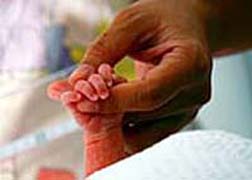 According to an FDA release from 2006, a case study indicated that infants born to mothers who took SSRIs such as Lexapro after their 20th week of pregnancy were six times more likely to develop the condition than those born to mothers who did not take the medications.
According to an FDA release from 2006, a case study indicated that infants born to mothers who took SSRIs such as Lexapro after their 20th week of pregnancy were six times more likely to develop the condition than those born to mothers who did not take the medications.The study, which was published in the New England Journal of Medicine, examined 377 women who had infants born with PPHN and 836 women who delivered healthy babies in the US between 1998 and 2003.
According to the study, 14 infants with PPHN and six babies who were healthy in the control group had been exposed to an SSRI after 20 weeks' gestation. However, the study could not find a true association between SSRI exposure before 20 weeks' gestation and PPHN, according to the release.
In addition to Lexapro, other SSRIs linked to PPHN in the study included Celexa, Fluvoxamine, Paxil, Symbyax, Zoloft and Paxil, according to the FDA.
Lexapro, which is used to treat depression and generalized anxiety disorder (GAD), comes in the form of a tablet and solution. The medication, like other SSRIs, works by increasing the amount of serotonin, which helps a person to maintain a mental balance, according to the National Center for Biotechnology Information.
Unlike many other medications, patients who miss doses of Lexapro are advised to take the medication immediately after remembering, but double doses are still not recommended to make up for one that is missed, the NCBI says.
READ MORE LEXAPRO BIRTH DEFECT LEGAL NEWS
Additionally, some less serious side effects of Lexapro can include nausea, constipation, drowsiness, dizziness and stomach pain.
Patients—particularly those who are pregnant—planning to take the medication should be cautious despite the fact that Lexapro was also recently linked to relief from hot flashes.
According to a recent study conducted by researchers at the University of Pennsylvania School of Medicine, 55 percent of the women examined who were taking Lexapro saw their hot flashes decrease by 50 percent or more.
USA Today reports that low doses of other antidepressants have also been linked to relief from hot flashes in previous research.
